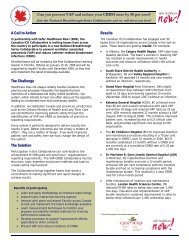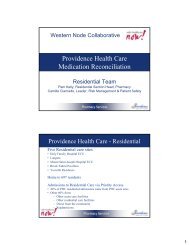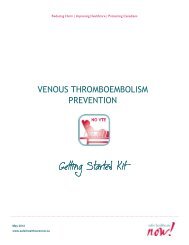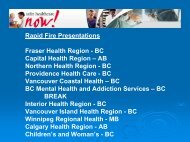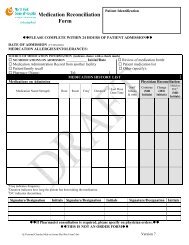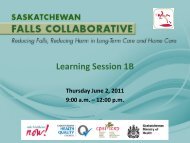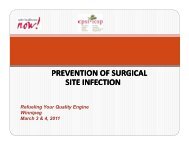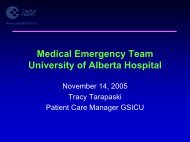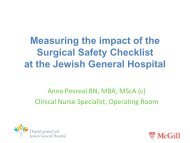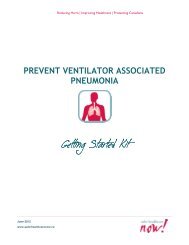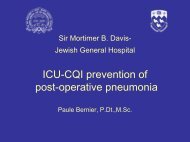Medication Reconciliation in Canada: Raising the Bar (2012) - CIHI
Medication Reconciliation in Canada: Raising the Bar (2012) - CIHI
Medication Reconciliation in Canada: Raising the Bar (2012) - CIHI
- No tags were found...
Create successful ePaper yourself
Turn your PDF publications into a flip-book with our unique Google optimized e-Paper software.
Renew<strong>in</strong>g <strong>the</strong> Focus on <strong>Medication</strong> <strong>Reconciliation</strong>Over <strong>the</strong> Last Two Years:Secur<strong>in</strong>g support and shar<strong>in</strong>g resourcesTo accomplish <strong>the</strong> <strong>the</strong>mes identified at <strong>the</strong> 2011 national summit a number of <strong>in</strong>itiatives have s<strong>in</strong>cebeen developed. These <strong>in</strong>itiatives demonstrate that improv<strong>in</strong>g communications about medicationsmust <strong>in</strong>volve health care leaders, practitioners, and <strong>the</strong> public.Consensus StatementThe commitment of thirteen national, Canadian health care organizations to support strategiesto improve communication on medication reconciliation was secured earlier <strong>in</strong> <strong>2012</strong>. A uniquecomponent of this work led by CPSI and ISMP <strong>Canada</strong> was <strong>the</strong> development of a consensusstatement endorsed by all organizations as shown <strong>in</strong> Figure 7. This statement was fur<strong>the</strong>rstreng<strong>the</strong>ned by <strong>the</strong> endorsement of Patients for Patient Safety <strong>Canada</strong> — <strong>the</strong> national voice ofpatients to improve safety <strong>in</strong> health care. Work to def<strong>in</strong>e <strong>the</strong> roles and responsibilities of eachhealth care professional <strong>in</strong> <strong>the</strong> medication reconciliation process is underway.Figure 7 – <strong>Medication</strong> reconciliation <strong>2012</strong> consensus statement<strong>Medication</strong> Safety: We all have a role to play.Safe patient care depends on accurate <strong>in</strong>formation. Patients benefit when cl<strong>in</strong>icians work with patients, families, and <strong>the</strong>ir colleagues to collectand share current and comprehensive medication <strong>in</strong>formation. <strong>Medication</strong> reconciliation is a formal process to do this at care transitions, suchas when patients enter <strong>the</strong> hospital, are transferred or go home. We all have a role to play.Accreditation <strong>Canada</strong>, <strong>Canada</strong> Health Infoway, <strong>the</strong> Canadian Medical Association, <strong>the</strong> Canadian Nurses Association, <strong>the</strong> Canadian PharmacistsAssociation, <strong>the</strong> Canadian Society of Hospital Pharmacists, Patients for Patient Safety <strong>Canada</strong>, <strong>the</strong> Royal College of Physicians and Surgeons of <strong>Canada</strong>,The College of Family Physicians of <strong>Canada</strong>, Canadian Patient Safety Institute and <strong>the</strong> Institute for Safe <strong>Medication</strong> Practices <strong>Canada</strong> actively supportstrategies to improve medication safety and call on all healthcare professionals to contribute to effective communication aboutmedications at all transitions of care to improve <strong>the</strong> quality and safety of our Canadian healthcare system.14 <strong>Medication</strong> <strong>Reconciliation</strong> <strong>in</strong> <strong>Canada</strong>: Rais<strong>in</strong>g <strong>the</strong> <strong>Bar</strong>



